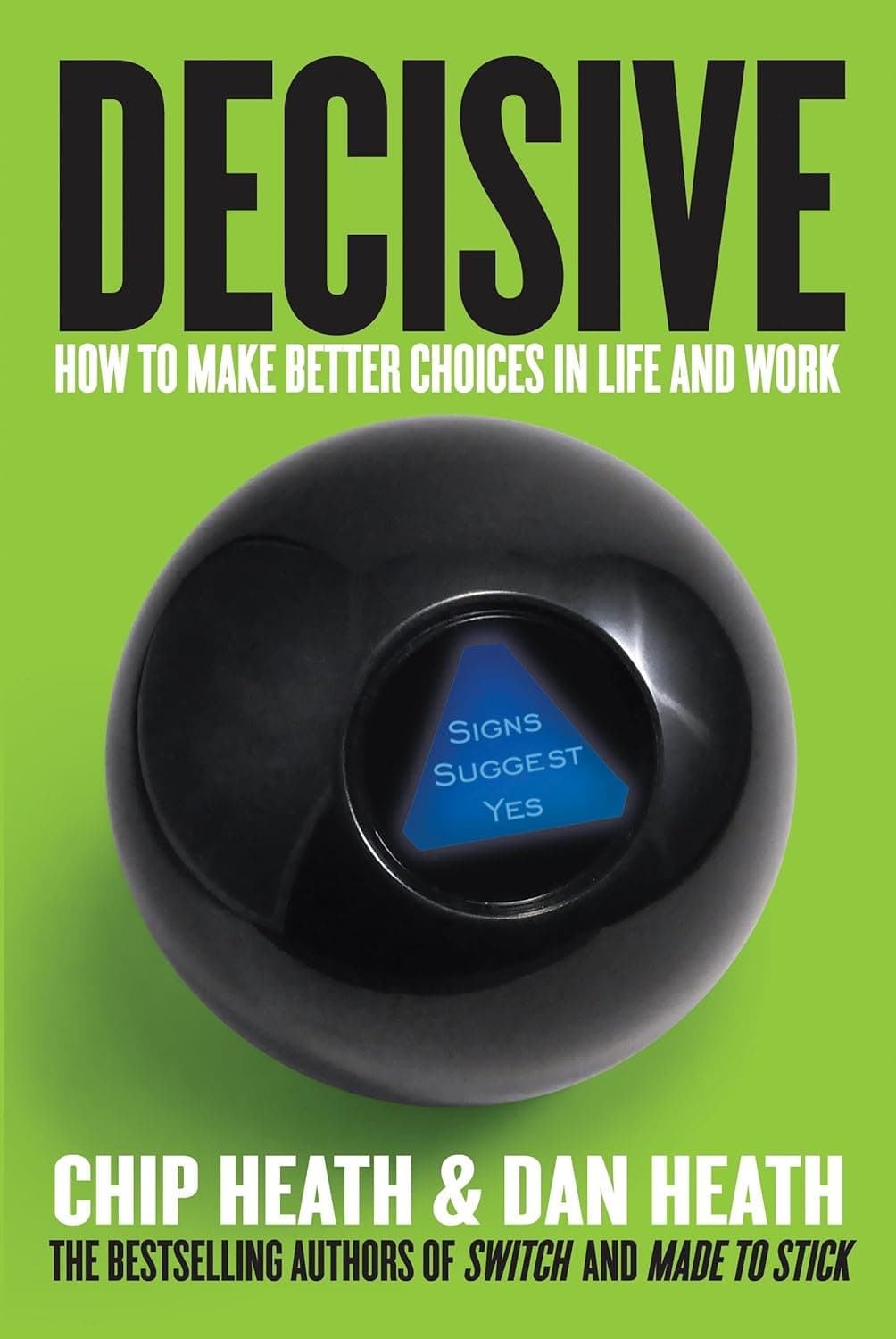
Decisive
By: Chip and Dan Heath
Category: Decision-making
Finished:
Highlights
The core difficulty of decision making is that we tend to do it without thinking based on what’s immediately obvious, we forget to look around and get all the information we need.
The pros and cons list doesn’t work. It’s open to too many biases and heuristics, ignores weights, and a host of other issues.
Whenever you think you have an “either or” decision, see if you can make it an “and” (this and that instead of this or that).
Avoid narrow framing : “…the tendency to define our choices too narrowly, to see them in binary terms.” Add options, don’t think either or, think about opportunity cost, ask what would happen if your current options disappeared.
Avoid confirmation bias : “When people have the opportunity to collect information from the world, they are more likely to select information that supports their preexisting attitudes, beliefs, and actions.”
“When we want something to be true, we will spotlight the things that support it, and then, when we draw conclusions from those spotlighted scenes, we’ll congratulate ourselves on a reasoned decision. Oops.”
Avoid the impact of short term emotion. Sometimes an effective way to analyze a situation is to ask yourself what someone would do if they were dropped into it with no prior history with the situation, no emotional attachment.
Avoid overconfidence: We tend to be overly confident about what the future will hold, especially after we’ve made a decision. We want it to be true.
To make better decisions, use the WRAP process:
- Widen Your Options.
- Reality-Test Your Assumptions.
- Attain Distance Before Deciding.
- Prepare to Be Wrong.
Adding more alternatives improve decision making. When you treat something as a “whether or not” option, you tend to make worse choices.
“What if we started every decision by asking some simple questions: What are we giving up by making this choice? What else could we do with the same time and money? ”
A good rule of thumb with options is to keep searching until you fall in love twice.
Multitracking , considering multiple options at once, can improve decision making significantly, help prevent egos from getting hurt, so long as you don’t add too many options and so long as they’re real good optoins.
Find someone who’s solved your problem : Find the “bright spots” inside your organization (see Switch), create decision “playlists” based on best practices, “ladder up” to come up with new ideas (swimsuit designs from “things that swim fast”).
Consider the opposite : Constructive disagreement is necessary for organizations to function well and for us to make good decisions. Ask disconfirming questions to avoid the confirmation bias. Test your assumptions with deliberate mistakes.
**Zoom out, zoom in: **Trust reviews for big decisions (jobs, college majors) too, not just for small ones (restaurants). Don’t assume your case is different from the typical (your restaurant is probably not special). Look for base rates.
Ooch: Run small experiments to test your theories, fire “bullets then cannonballs” (see Lean Startup).
Use the “10/10/10” strategy to question your decisions. How will you feel about them in 10 minutes, 10 months, 10 years?
Our bias towards the status quo comes from our aversion to losses, and our preference for things we’ve been exposed to. How many ideas do you believe simply because they’ve been repeated a lot and are “normal?”
A powerful tool: “ What would I tell my best friend to do in this situation?”
Agonizing decisions are often a sign of conflict between your core priorities. By identifying and clarifying your core priorities, you can make other decision making easier.
A “premortem,” identifying why something would likely fail, can help prevent against those failures.
You can do the same to identify what will make you succeed. If it’s a year from now and you’re wildly successful, what most likely led to it?
Use deadlines and tripwires to kick yourself out of autopilot, and to prevent yourself from doubling down on bad decisions. We spend much of our life on autopilot. Have a reflection ritual.

